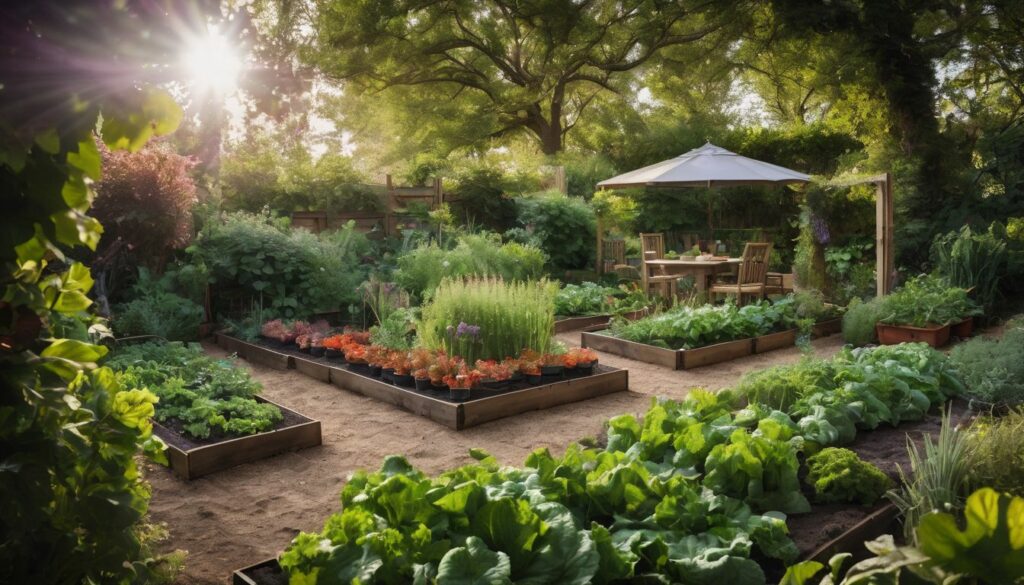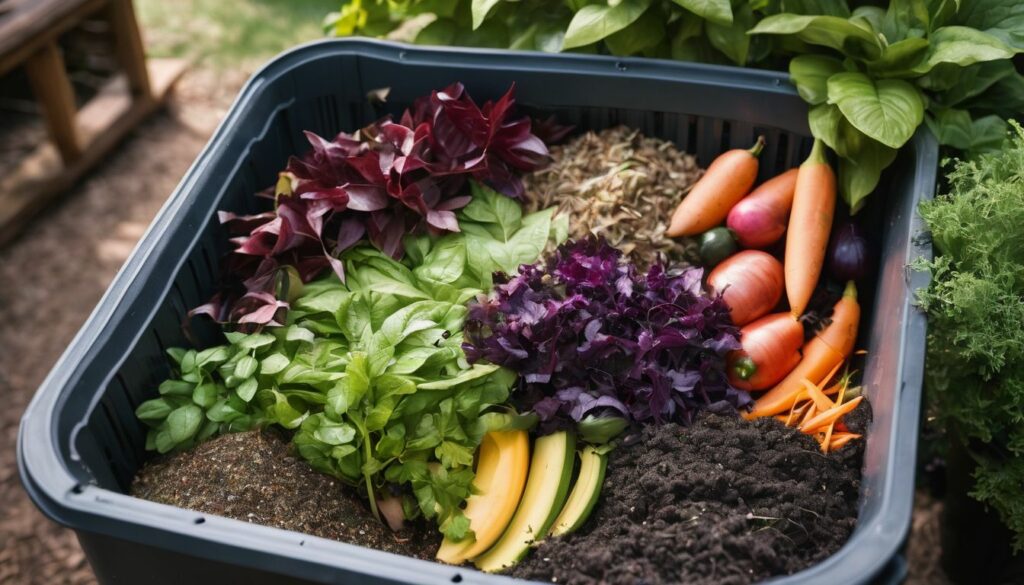In a world where big farms get bigger and small family plots seem to fade, it’s fair to wonder: does the little guy stand a chance? You might be worried about what all this means for your food, your community, and our planet.
The truth is, when smaller hands till the land, something special happens — they’re not just growing crops; they’re nurturing the earth itself. This kind of care has a name: sustainable agriculture.
Believe it or not, these tiny patches of nurtured land pack a mighty punch for sustainability. Take this one surprising fact—small-scale farmers actually produce over 70% of the world’s food! And yet, their impact on keeping our environment healthy is even bigger than you’d think.
Our article will guide you through how these farming heroes help our planet while putting food on our tables. By diving into their world with us, you’ll understand why supporting them could be one of the best choices we make for tomorrow’s earth.
Get ready to root for the underdog – small-scale farming might just be the secret hero in creating a greener future!
Key Takeaways
- Small – scale farming, which accounts for over 70% of the world’s food production, plays a crucial role in sustainable agriculture by promoting local food production, reducing environmental impact, and supporting rural economies.
- By embracing sustainable practices such as organic farming and agroforestry, small-scale farmers reduce environmental damage through minimized soil erosion and chemical runoff. Their efforts also contribute to biodiversity conservation and improved water quality.
- Small – scale farming provides new opportunities for American agriculture, supports the local economy by creating jobs and reducing reliance on industrial farming methods. Supporting them can lead to more resilient and sustainable food systems.
The Definition and Importance of Small-Scale Farming
Small-scale farming refers to the practice of cultivating a relatively small area of land and producing a limited amount of agricultural products. This type of farming is crucial for sustainable agriculture as it promotes local food production, reduces environmental impact, and supports rural economies.
What defines small-scale farming
Small-scale farming often means family farms and smallholder farms. These farms are run by one family or a small group of people. They don’t have lots of land or many animals. The way they farm helps the earth because they grow many types of plants and raise different kinds of animals in the same place.
This mix can make the soil healthy and stop bugs and diseases from hurting the crops too much.
Farmers on these small plots usually know their land well. They use this knowledge to choose what to grow based on what works best where they live. Many times, these farmers sell their food close to home which supports local communities and economies.
Because they do not ship their food far away, it also helps cut down on pollution from trucks and planes that carry food all over the world.
Why small-scale farming is important for sustainable agriculture
Small-scale farming is important for sustainable agriculture as it contributes to stronger local economies and provides economic opportunities for farmers. Sustainable agriculture, supported by small-scale farming, leads to better land quality, improved communities, and higher-quality consumer products.
Small farms often have better environmental, economic, and social outcomes compared to larger farms. Despite challenges faced by smallholder farmers such as food insecurity and poverty in rural areas, they play a crucial role in sustainable agriculture and can contribute to the overall improvement of farming practices.
Sustainability in agriculture has positive impacts on the environment, animals, and people. Smaller farms reduce environmental damage through their localized ecosystem management and tangible differences in sustainability practices.
The Impact of Small-Scale Farming on the Environment
Small-scale farming reduces environmental damage and promotes local ecosystem management, leading to tangible differences in sustainable agricultural practices.
Reduced environmental damage
Small-scale farming helps reduce environmental damage by promoting sustainable practices such as crop rotation, organic farming, and agroforestry. These methods minimize soil erosion, chemical runoff, and water pollution while maintaining biodiversity.
By using natural fertilizers and avoiding harmful chemicals, small-scale farmers play a crucial role in protecting ecosystems and preserving water quality. Their focus on sustainable resource management contributes to overall environmental sustainability, benefiting both local communities and the broader agricultural landscape.
These efforts align with the goal of improving the quality of land and minimizing the negative impact of agriculture on the environment. Small-scale agriculture allows for more localized ecosystem management, leading to tangible differences in sustainable practices that have positive impacts on both rural farming areas and wider agricultural sustainability initiatives.
Local ecosystem management
Small-scale farming plays a crucial role in local ecosystem management by promoting biodiversity, soil health, and natural resource conservation. Through sustainable practices such as crop rotation, organic farming, and agroforestry, small farms contribute to maintaining the balance of local ecosystems.
These practices minimize the use of harmful chemicals and promote natural pest control methods, leading to healthier soils and diverse habitats for wildlife. By prioritizing sustainability over intensive production, small-scale farmers are instrumental in preserving the ecological integrity of their surrounding environments.
Moving on to “Economic Benefits of Small-Scale Farming”..
Tangible differences in sustainable practices
Small-scale farming brings tangible differences to sustainable agriculture. These farms often use organic agricultural methods, reducing reliance on synthetic pesticides and fertilizers.
This promotes healthier ecosystems and better living conditions for farmworkers and nearby communities. Additionally, small-scale farmers tend to adopt diversified crop rotation practices, which help maintain soil fertility and reduce the risk of disease outbreaks in crops.
Agroforestry is another sustainable practice embraced by small-scale farming operations. By integrating trees into their farming systems, smallholders contribute to carbon sequestration, biodiversity conservation, and improved water quality.
Moreover, these farmers commonly implement intensive grazing techniques that enhance pasture productivity while minimizing environmental degradation through overgrazing. These tangible differences not only benefit the environment but also play a crucial role in strengthening local economies and fostering community resilience.
Economic Benefits of Small-Scale Farming
Small-scale farming provides new opportunities for American agriculture, supports the local economy, and reduces reliance on industrial farming.
Providing new opportunities for American agriculture
Small farms in America provide new opportunities for agriculture. They contribute to local economies and help maintain rural communities. Small-scale farming encourages sustainable practices, which can lead to better land quality and healthier consumer products.
Moreover, it decreases reliance on industrial farming methods with their heavy use of chemicals, benefiting both the environment and consumers.
Additionally, small farms support diversity in agricultural production and help preserve traditional farming practices. By creating direct relationships between producers and consumers through farmers’ markets or community-supported agriculture (CSA), small-scale farming enhances food security while fostering a deeper understanding of where our food comes from.
Supporting the local economy
Providing new opportunities for American agriculture can also greatly contribute to supporting the local economy. Small-scale farming fosters stronger local economies by creating jobs, increasing demand for local goods and services, and reducing the dependence on imported products.
This in turn helps improve the economic well-being of rural communities, leading to sustainable growth and development. By investing in small-scale farms and locally produced agricultural products, consumers play a crucial role in sustaining their community’s economy, while small farmers are empowered to continue practicing sustainable agriculture that benefits everyone involved.
Reducing the reliance on industrial farming
Supporting the local economy has a direct impact on reducing the reliance on industrial farming. Small-scale farming contributes to diversified and resilient local economies, lessening the need for large-scale industrial agriculture.
By supporting small farms, consumers can reduce their dependence on mass-produced food from industrial farms while promoting sustainable agricultural practices in their communities.
This shift towards smaller scale farming not only supports local economies but also helps in mitigating some of the negative impacts associated with industrial agriculture, ultimately leading to more sustainable and resilient food systems.
Recommended Sustainable Farming Practices
Implementing sustainable farming practices such as organic farming, permaculture, and aquaponics can make a significant impact on the environment. Interested to learn more? Keep reading to discover how small-scale farming is shaping sustainable agriculture!
Organic farming
Organic farming emphasizes the use of natural processes and cycles. It avoids synthetic pesticides and fertilizers, promoting soil health and biodiversity. This method reduces chemical exposure for farmers, consumers, and the environment while also conserving water and enhancing ecological balance.
Organic agriculture contributes to sustainable food systems by minimizing environmental damage and providing healthier food options for communities.
Moving on from organic farming, let’s now explore “Agroforestry” practices in sustainable agriculture.
Agroforestry
Agroforestry combines agriculture and forestry, integrating trees and shrubs with crops and livestock. This practice offers multiple benefits such as improved soil health, increased biodiversity, reduced erosion, and enhanced carbon sequestration.
Research shows that agroforestry systems can help small-scale farmers diversify their income sources while promoting sustainable land management. By incorporating trees into farming practices, smallholder producers can enhance resilience to climate change, improve local ecosystems, and contribute to sustainable agriculture.
Moving on from the impact of agroforestry on sustainable agriculture, let’s delve into the concept of permaculture and its significance in small-scale farming practices.
Permaculture
Moving on from agroforestry, another recommended sustainable farming practice is permaculture. Permaculture focuses on designing agricultural systems that mimic the natural ecosystem’s diversity and resilience.
By integrating different plants and animals, permaculture aims to create self-sustaining and regenerative farming systems. This approach not only promotes biodiversity but also enhances soil fertility, reduces water usage, and minimizes the need for external inputs such as fertilizers or pesticides.
Additionally, permaculture emphasizes community involvement and knowledge sharing, making it a holistic approach to sustainable agriculture.
Aquaponics
Moving from permaculture to aquaponics, another sustainable farming practice gaining traction is aquaponics. This method combines aquaculture (fish farming) with hydroponics (soilless plant culture).
In an aquaponic system, fish waste provides a natural fertilizer for plants, while plants clean and filter the water that is then recycled back to the fish tanks. This closed-loop system minimizes water usage and creates a symbiotic relationship between fish and plants.
Aquaponics offers an efficient way to produce both vegetables and fish in a small space, maximizing yield while minimizing environmental impact.
Pastured poultry
Moving from aquaponics to pastured poultry, small-scale farming encompasses a range of sustainable practices. Pastured poultry involves raising chickens on pasture, allowing them access to fresh air, sunlight, and a natural diet of insects and vegetation.
This practice not only provides high-quality products but also promotes animal welfare and reduces the environmental impact of traditional confined poultry production. Additionally, pastured poultry contributes to soil health by distributing nutrients through their manure as they roam freely on the pasture.
Small farms can benefit significantly from incorporating pastured poultry into their operations. The method enhances soil fertility, reduces reliance on external inputs like feed and antibiotics, and enables farmers to produce nutritious eggs and meat sustainably.
Crop rotation
Pastured poultry offers numerous benefits, and another essential sustainable farming practice is crop rotation. Crop rotation involves growing different types of crops in the same area over a sequence of seasons.
This method helps to improve soil fertility, control pests and diseases naturally, and reduce the reliance on chemical fertilizers or pesticides. By rotating crops, small-scale farmers can maintain healthy soil structure and promote biodiversity while minimizing the impact on the environment.
Additionally, crop rotation plays an important role in sustainable agriculture by enhancing nutrient availability for subsequent crops and contributing to long-term agricultural productivity.
Intensive grazing
After implementing sustainable crop rotation practices, small-scale farmers can also consider incorporating intensive grazing into their farming methods. Intensive grazing involves rotating livestock through smaller paddocks to maximize forage consumption and promote soil health.
This practice helps build organic matter in the soil, increases nutrient recycling, and reduces the need for synthetic fertilizers. By allowing animals to graze intensively on smaller areas for short periods, it mimics natural grazing patterns and encourages healthier pastures while minimizing overgrazing.
Implementing intensive grazing benefits the environment by reducing soil erosion, improving water infiltration, and enhancing biodiversity within the pastures. Moreover, it can lead to an increase in carbon sequestration as a result of improved pasture management.
Sustainable resource management
Small-scale farming plays a crucial role in sustainable resource management by promoting efficient use of resources like water, land, and energy. This type of agriculture often emphasizes organic and regenerative practices that help conserve soil health and minimize chemical inputs.
Smallholder farmers also tend to prioritize biodiversity conservation, preserving local ecosystems while reducing greenhouse gas emissions through sustainable cultivation methods. By integrating agroforestry techniques and practicing crop rotation, small-scale producers contribute to the overall health and resilience of agricultural landscapes, ensuring the long-term viability of essential natural resources.
Next, let’s delve into the significance of incorporating these recommended sustainable farming practices for a more comprehensive understanding of their impact on small-scale agriculture.
Conclusion
In conclusion, the impact of small-scale farming on sustainable agriculture is significant. Implementing recommended sustainable farming practices, such as organic farming and agroforestry, can lead to practical and efficient improvements.
These strategies not only benefit the environment but also create economic opportunities for farmers while supporting local economies. Emphasizing the importance of these approaches can lead to significant improvements in land quality, communities, and consumer products.
Interested readers can explore additional resources to delve deeper into sustainable agriculture and be inspired to contribute to a more sustainable future.
FAQs
1. What is small-scale farming?
Small-scale farming is when farmers grow crops or keep animals on a small piece of land.
2. Can small-scale agriculture help the earth?
Yes, small farmers can use ways that are good for the nature and make sure the land can be used for a long time.
3. Do small producers have a big effect on sustainable agriculture?
Small producers are very important because they take care of their land well and this helps all of us have food without hurting our planet.
4. Why is it good to support small farms?
Helping small farms means we are saying yes to healthy food and taking care of our earth, which is good for everyone.





